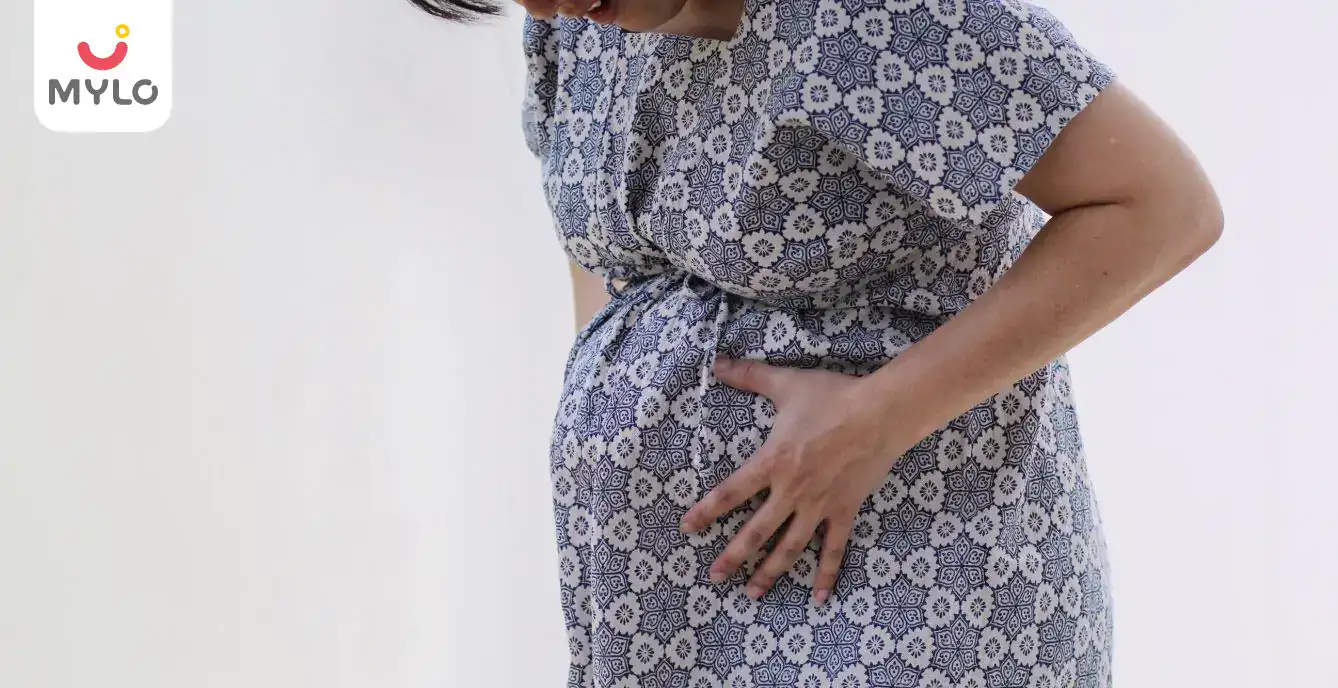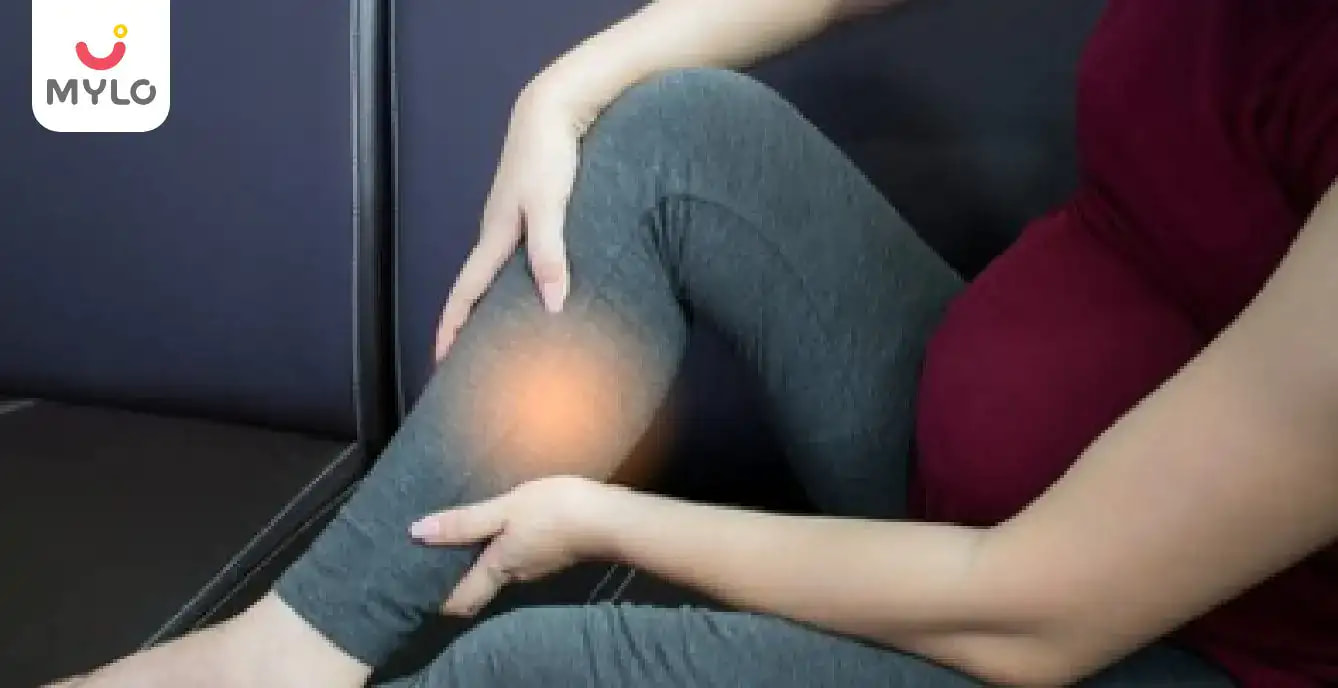- Home

- Leg Cramps

- Leg Cramps During Pregnancy: Causes, Treatment And Home Remedies
In this Article
Leg Cramps
Leg Cramps During Pregnancy: Causes, Treatment And Home Remedies
Updated on 27 February 2023
Pregnancy isn't often a cakewalk. Sure, we hear how wonderful it is, but the first few months may have been filled with morning sickness and heartburn. And just when you believed you were out of the woods, leg cramps during pregnancy come along. Leg cramps are a common pregnancy symptom in the second and third trimesters. Leg cramps during pregnancy in the third trimester affect nearly half of all pregnant women.
You may experience leg cramps during pregnancy at night when you are trying to get the sleep you're probably craving and feel tightness in your calf, foot, or both areas. Some women also experience them after sitting in one position for an extended period. It may not be possible to prevent leg cramps entirely. But preventative and relief measures such as stretching, staying active, and drinking plenty of water may help reduce your symptoms and get your mind back to the true pleasures of pregnancy.
When Do Leg Cramps During Pregnancy Start?
Sometimes also called "Charley horses", leg cramps during pregnancy usually begin in the second or third trimester. These painful spasms that radiate through the calves and up the legs are very common among pregnant women. Even though they can be felt during the day, they are usually worse at night, when fatigue and fluid buildup are at their worst.
You may also like to read : In What Situations Can a Doctor Recommend You to Take Bed Rest During Pregnancy?
What Causes Leg Cramps During Pregnancy?
There are various reasons for leg cramps during pregnancy. Some of them are:
1. Circulation changes
During pregnancy, circulation slows, which is common and not a reason to worry, which is due to overactive hormones. During the last trimesters, your body experiences increased blood volume, contributing to slow circulation, which can cause swelling and cramping in your legs.
2. Dehydration
Are you drinking sufficient water? During pregnancy, you should drink twelve cups of water every day. Look out for signs of dehydration, such as dark yellow pee. Dehydration can lead to and worsen leg cramps. Try increasing your daily water intake if you're experiencing them.
3. Weight gain
The pressure from your thriving baby can take a toll on your nerves and blood vessels, including those running through your legs. Hence, you're more likely to experience leg cramps as your pregnancy progresses, particularly in the third trimester. Maintaining a healthy weight and staying active during pregnancy may help prevent leg cramps. Speak to your doctor if you're concerned.
4. Fatigue
It is common to feel tired during pregnancy since you're accumulating a tiny human, and this is especially true as you gain more weight in the second and third trimesters. As your muscles get tired from additional pressure, it can result in leg cramps. Try sipping plenty of water, going for a walk during the day, and stretching before sleep to prevent leg cramps due to muscle cramps.
5. Calcium or magnesium deficiency
Having less calcium or magnesium in your diet can lead to lead cramps. However, if you're already taking a prenatal vitamin, you don't require any additional supplement. Talk to your doctor if you're worried you aren't getting enough of these nutrients. You're probably getting lab tests done occasionally, so it doesn't hurt to have these levels tested.
6. DVT blood clot
A deep vein thrombosis blood clot can happen in the legs, thigh or pelvis. Pregnant women are 5 to 10 times more likely to develop a DVT than non-pregnant women. The best way to prevent DVT during pregnancy is to avoid hours of inactivity. If your job requires a lot of sitting, you could select a quiet alarm on your phone to go off every hour to prompt you to get up and walk, probably to the water cooler to add to your water intake for the day.
Some blood clot symptoms resemble leg cramps, but a DVT blood clot is a medical emergency. Seek medical care immediately if you experience signs like a lot of pain in your legs when you're standing or moving around, severe swelling or warm-to-the-touch skin near the affected area.
How To Manage Leg Cramps During Pregnancy?
Some home remedies for leg cramps during pregnancy include:
1. Stretching before bed
Doing calf stretches at night may help prevent or ease leg cramps. Stand facing a wall at an arm's length away. Next, place your hands on the wall in front of you. Hold your right foot back, keep your heels on the floor the whole time, and bend your left knee while holding your right leg straight. Hold your left knee bent so you feel the stretch in your right calf muscle. Hold the position for 30 seconds. Switch legs, if required.
2. Staying hydrated
Drinking plenty of water during pregnancy is essential to prevent dehydration since it can lead to those awful leg cramps. Aim to drink at least 8 to 12 cups of water daily during pregnancy.
3. Applying heat
Try applying heat to your cramping muscles which may help loosen up the cramp. There is no need to purchase a fancy heating pad. You can also use a microwave-safe cloth pack or bag filled with rice.
4. Massaging the area
When you develop a leg cramp, performing a self-massage may help ease or reduce your pain. Use one hand to massage your calf gently or wherever your leg is cramping. Do this self-massage for 30 seconds to a minute to reduce your cramp. You can also get a prenatal massage, which can be a wonderful experience. Look for a trained therapist in your area specialising in working with pregnant women.
5. Exercising
It is brilliant to stay active throughout your pregnancy, even though you don't want to overdo it. With your doctor's permission, pregnancy-safe activities like prenatal yoga, walking and swimming can benefit you and the baby. Staying active can also prevent excess weight gain, improve circulation and help prevent leg cramps. Always stretch and warm up before and after performing any activities, so your muscles don't cramp up afterwards.
6. Avoiding inactivity
You may not have the time or energy for a challenging hike or run during pregnancy. It is ok; you must listen to your body and know your limits. However, sitting for a long duration can lead to leg and muscle cramps. Make sure to stand up and walk around every few hours to avoid this. Fix a timer on your phone or watch if you forget to get up during the day.
7. Select proper footwear
Wear shoes with comfort, support and utility. Wear shoes with a firm heel counter, the part of the shoe that surrounds the heel and helps lock the foot into the shoe.
8. Take calcium or magnesium supplement
Limited studies suggest that taking a magnesium supplement might help to prevent leg cramps during pregnancy. Consider including food rich in calcium and magnesium in your diet.
When Should I See A Doctor?
Leg cramps are common during pregnancy. However, if you're concerned about your pain or they're causing too much-lost shut-eye, mention it to your doctor at your next prenatal visit. Also, contact your doctor and let them know if your leg cramps are severe, persistent or worsening. You may require supplements or medication. If you experience severe swelling in one or both legs, pain walking, or enlarged veins, seek medical care since these may be signs of a blood clot.
Summary
Encountering leg cramps during pregnancy isn't pleasant. However, it is a common symptom, especially at night. You can manage leg cramps by following some of the tips mentioned above. Always let your doctor know if you have any associated worries. Never feel insecure or self-conscious about calling or emailing your doctor. Assisting you through a healthy pregnancy is the number one concern of your doctor.



Written by
Ravish Goyal
Official account of Mylo Editor
Read MoreGet baby's diet chart, and growth tips

Related Articles
Related Topics
RECENTLY PUBLISHED ARTICLES
our most recent articles
Baby Care
When is the best time to give your child cow's milk and how to make the switch easier?

Labour & Delivery
How to Handle Giving Birth to a Baby Alone?

Getting Pregnant
Can You Get Pregnant During Your Period?

Pregnancy
When to Make an Emergency Doctor Visit During Pregnancy?

General Toddler
How to Help Your Toddler Overcome their Shyness?

Announcements & Celebrations
Piercing Your Baby's Ears: Risks & Precautions
- Which Food items to Include & Avoid During Third Trimester of Pregnancy for optimum nutrition?
- Breech Baby: Causes, Risks, Flipping & Delivery
- Everything You Need to Know About the Different Stages of Labour
- What are the Symptoms of Vitamin D Deficiency in Children?
- Top 5 Effective Ways to Prevent Diabetes in Children
- Why and When Is the Tetanus Toxoid (TT) Vaccine Given During Pregnancy?
- How to Guide Your Child to Make Healthy Food Choices and Get the Required Nutrition?
- How Can You Manage Asthma During Pregnancy?
- Water Breaking Early: Signs, Causes & Next Steps
- Foods to eat for healthy fetal brain development
- How touch can shape babies’ brain development
- In What Situations Can a Doctor Recommend You to Take Bed Rest During Pregnancy?
- How to Hold a Newborn Baby
- Why do you need to burp your baby and what are the best positions to burp your baby?


AWARDS AND RECOGNITION
Mylo wins Forbes D2C Disruptor award
Mylo wins The Economic Times Promising Brands 2022
AS SEEN IN
















At Mylo, we help young parents raise happy and healthy families with our innovative new-age solutions:
- Mylo Care: Effective and science-backed personal care and wellness solutions for a joyful you.
- Mylo Baby: Science-backed, gentle and effective personal care & hygiene range for your little one.
- Mylo Community: Trusted and empathetic community of 10mn+ parents and experts.
Product Categories
baby carrier | baby soap | baby wipes | stretch marks cream | baby cream | baby shampoo | baby massage oil | baby hair oil | stretch marks oil | baby body wash | baby powder | baby lotion | diaper rash cream | newborn diapers | teether | baby kajal | baby diapers | cloth diapers |





